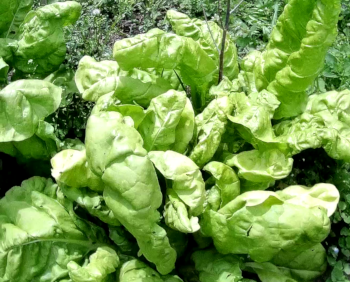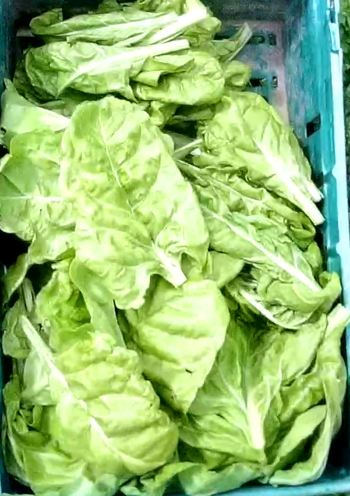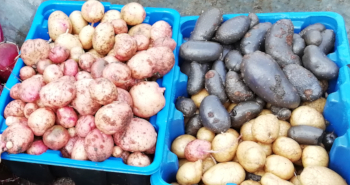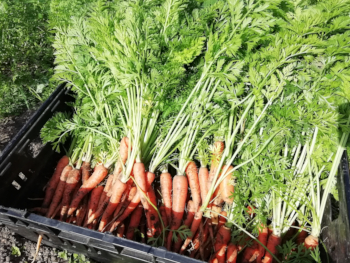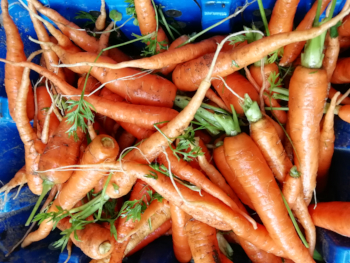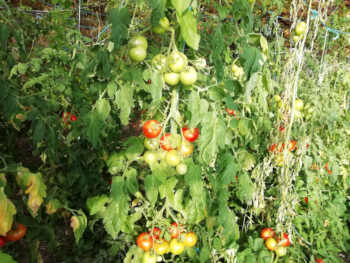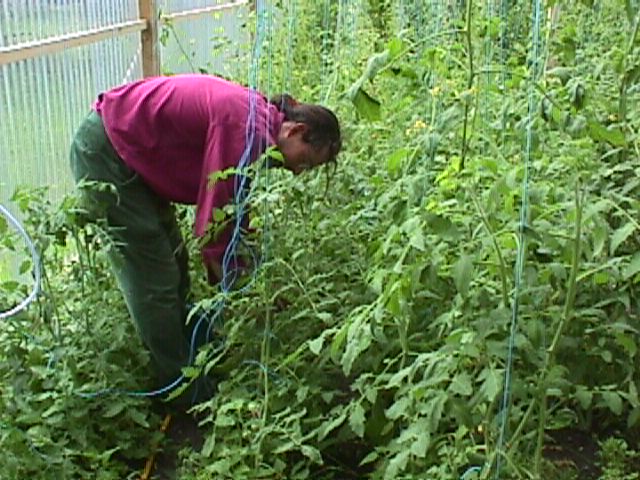 Our vegetables are "hand made". That means we are personally nurturing them from germination to harvest. It means seed is
Our vegetables are "hand made". That means we are personally nurturing them from germination to harvest. It means seed is
placed in the ground and we pick the tomato from the vine and the carrot from the soil when it is ready. We eat everything that comes from the garden, often without washing it because it's always clean and fresh, so we know it's good. The best time to get our veg is from spring to autumn when the harvest is coming in.
It is real food that thrives in the garden and helps you thrive too. It tastes different and makes you feel good. Many of the varieties we grow are "super foods" which means they are packed with vitamins, minerals, trace elements and flavour (which best preserved if eaten raw or only lightly cooked). We like to think of it as health food - an alternative to medicine or drugs pushed by the pharma giants with questionable morals and debatable efficacy. Our super foods include broad beans, kale, savoy cabbage, red cabbage, chard, beetroot.
It is wonderful to see young and old pick food from the garden and pop it straight in to their mouths!
Pricing is always a challenge because we have very high costs of production so we aim to match supermarket prices for organics. That means that often our veg is cheaper than in the country market!
|
Check out Nutrition and You. |
Vegetables are always best fresh. Most nutrition is available when eaten raw. |
Prices Indicative and T&Cs apply |
|
Kale Supercharged with antioxidants like vitamin C, beta-carotene, kaempferol and quercetin, kale is one of the vegetables with the highest total antioxidant capacity, as measured by ORAC. ORAC, which stands for Oxygen Radical Absorbance Capacity, measures foods' ability to scavenge free radicals. Free radicals are unstable molecules that can cause damage to your body at the cellular level. The cellular damage caused by free radicals has been implicated in the pathogenesis of several diseases and disorders, including macular degeneration of the eye, cardiovascular diseases, thrombosis, asthma, an impaired immune system, atherosclerosis, Alzheimer's disease, diabetes, and rheumatoid arthritis. 1 cup of raw kale has just 33 calories yet contains 684% of vitamin K, 134% of vitamin C, 206% of Vitamin A plus iron, folate, omega-3s, magnesium, calcium, iron, fiber, and 2 grams of protein. Kale possesses phytonutrients, which quell inflammation, improve the liver’s detox ability, and can even protect brain cells from stress. |
 |
€ 10 /kg |
|
Cabbage/red cabbage/savoy cabbage Cabbage is a storehouse of phytochemicals like thiocyanates, indole-3-carbinol, lutein, zeaxanthin, sulforaphane, and isothiocyanates. These compounds are potent antioxidants and known to help protect against breast, colon, and prostate cancers and help reduce LDL or "bad cholesterol" levels in the blood. Red cabbage contains anthocyanins which are considered one of the most important nutrients for eye health, but recent research suggests that due to their strong anti-inflammatory and antioxidant properties, these flavonoids may also help alleviate certain inflammatory conditions such as rheumatoid arthritis. |
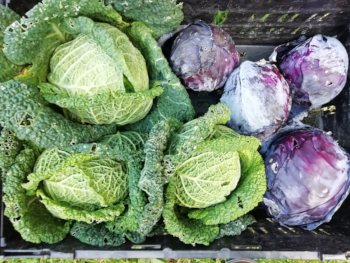 |
€ 2 /kg |
|
Brocolli/cauliflower Broccoli's nutritional value and high concentration of phytochemicals may help reduce the risk of several diseases, including cancer, cardiovascular diseases, respiratory conditions such as asthma, and osteoporosis. It may also help reduce chronic inflammation, lower blood sugar levels, aid in weight loss, and boost the health of your skin and eyes. Cauliflower contains several anti-cancer phytochemicals like sulforaphane and plant sterols such as indole-3-carbinol, which appear to function as an anti-estrogen agent. Together, these compounds have proven benefits against prostate, breast, cervical, colon, ovarian cancers by their cancer-cell growth inhibition, cytotoxic effects on cancer cells. |
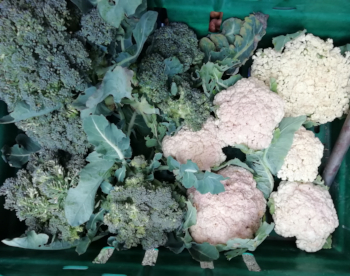 |
€ 2 /kg |
|
Broad beans Broad beans are one of the most complete foods we grow. They're full of vitamins and minerals, low in fat and high in protein. The beans are a very rich source of protein being 26% protein, more than most cuts of beef steak! Without the fat. They provide phytonutrients such as isoflavone and plant sterols which help protect against some cancers and lower cholesterol. They contain good amounts of vitamin-B6, vitamin B-1, riboflavin and niacin and are one of the finest sources of minerals like iron, copper, manganese, calcium, magnesium. They also contain Levo-dopamine which may help with Parkinson's Disease. And they provide dietary fiber to keep the pipes clean. |
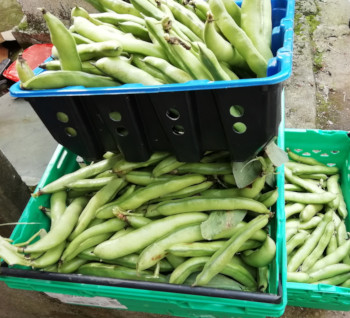 |
€ 3 /kg |
|
French beans Another yummy food rich in vitamnins and minersals and providing a good source of dietary fibre. French beans are not as high in protein as broad beans (only 2% compared to 26%) but have vitamin A, vitamin-B6, vitamin B-1, vitamin-C and vitamin-K, as well as healthy amounts of folates and minerals like iron, calcium, magnesium, manganese, and potassium. An important dietary carotenoid in the beans is Zea-xanthin, which is selectively absorbed into the retinal macula lutea in the eyes where it is thought to provide antioxidant and protective UV-light filtering functions, so offer some protection in the prevention of age-related macular disease. |
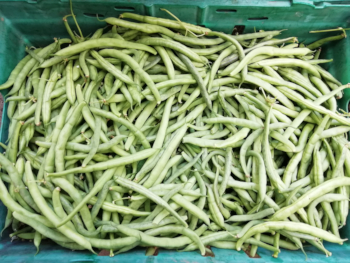 |
€ 10 /kg |
|
Chard/Spinach Swiss chard and spinach are storehouses for many phytonutrients that have health promotional and disease prevention properties. 100 g of fresh spinach contains about 25% of daily intake of iron, which is an essential trace element required by the human body for red blood cell production and as a co-factor for an oxidation-reduction enzyme, cytochrome oxidase during the cellular metabolism. Chard is also high in iron. Both vegetables are excellent sources of antioxidant vitamin, vitamin-C, omega-3 fatty acids, and vitamin-A, flavonoids antioxidants like ß-carotene, alpha-carotene, lutein, and zeaxanthin, B-complex group of vitamins such as folates, niacin, vitamin B-6 (pyridoxine), thiamin and pantothenic acid minerals like copper, calcium, sodium, potassium, iron, manganese and phosphorus Chard is an excellent source for vitamin-K: 100 g provides about 700% of RDA! Vitamin-K has potential role bone health by promoting bone formation and strengthening activity. Adequate vitamin-K levels in the diet also help limiting neuronal damage in the brain; thus, has an established role in the treatment of patients who have Alzheimer's disease. Regular inclusion of chard in the diet has been found to prevent osteoporosis, iron-deficiency anemia, and vitamin-A deficiency; and believed to protect from cardiovascular diseases and colon and prostate cancers. |
|
€ 10 /kg |
|
Potatoes We are surprised by how different potatoes from the garden taste compared to potatoes from the factory farm. They taste! We grow different varieties which complement different menus. Some are more floury, some more waxy, some light, some dark and some weird shapes - eg fingerlings like Pink Fir Apple. And for a special occasion we have a few violettas which are purple all the way through! Potatoes might seem innocuous but they are a valuable part of your diet because, for the weight, they are low in calories. 100g of bread, rice or pasta will give you around 400 calories, but you'll only get 80 from 100g of potatoes. Plus they have vitamins and minerals, especially in the skin and especially in red potatoes. They offer B-complex vitamins such as pyridoxine (vitamin B6), thiamin, niacin, pantothenic acid, and folates, vitamin-C and many essential minerals like iron, manganese, magnesium, phosphorous, and copper. |
|
€ 2-6.00 /kg |
|
Onions The phytochemical compounds allium and Allyl disulfide in the onions convert into allicin by the enzymatic reaction when its bulb (modified leaves) are distorted (crushing, cutting, etc.). Studies have shown that these compounds have anti-mutagenic (protects from cancers) and anti-diabetic properties (helps lower blood sugar levels in diabetics). Laboratory studies show that allicin reduces cholesterol production by inhibiting HMG-CoA reductase enzyme in the liver cells. Further, it also found to have antibacterial, antiviral, and anti-fungal activities. Additionally, Allicin also decreases blood vessel stiffness by facilitating the release of nitric oxide (NO) and thereby bring a reduction in the total blood pressure. Further, it blocks platelet clot formation and has fibrinolytic action (clot breakdown) in the blood vessels and thereby prevents blood clots from growing and becoming problematic. Altogether, it helps decrease in overall risk of coronary artery disease (CAD), peripheral vascular diseases (PVD), and stroke. |
 |
€ 2.50 /kg |
|
Beetroot Beets are highly nutritious and “cardiovascular health” friendly root vegetables. Certain unique pigment antioxidants in this root and its top greens have been found to offer protection against coronary artery disease and stroke, lower cholesterol levels within the body, and have anti-aging effects. The root is a rich source of the phytochemical compound, glycine betaine. Betaine has the property of lowering homocysteine levels within the blood. Homocysteine, one of the highly toxic metabolite, promotes platelet clot as well as atherosclerotic plaque formation, which, otherwise, can be harmful to blood vessels. High levels of homocysteine in the blood result in the development of coronary heart disease (CHD), stroke and peripheral vascular diseases. The root is a rich source of B-complex vitamins such as niacin (B-3), pantothenic acid (B-5), pyridoxine (B-6) and minerals such as iron, manganese, copper, and magnesium. The top leaves are high in vitamin-C, carotenoids, flavonoid anti-oxidants, and vitamin A. |
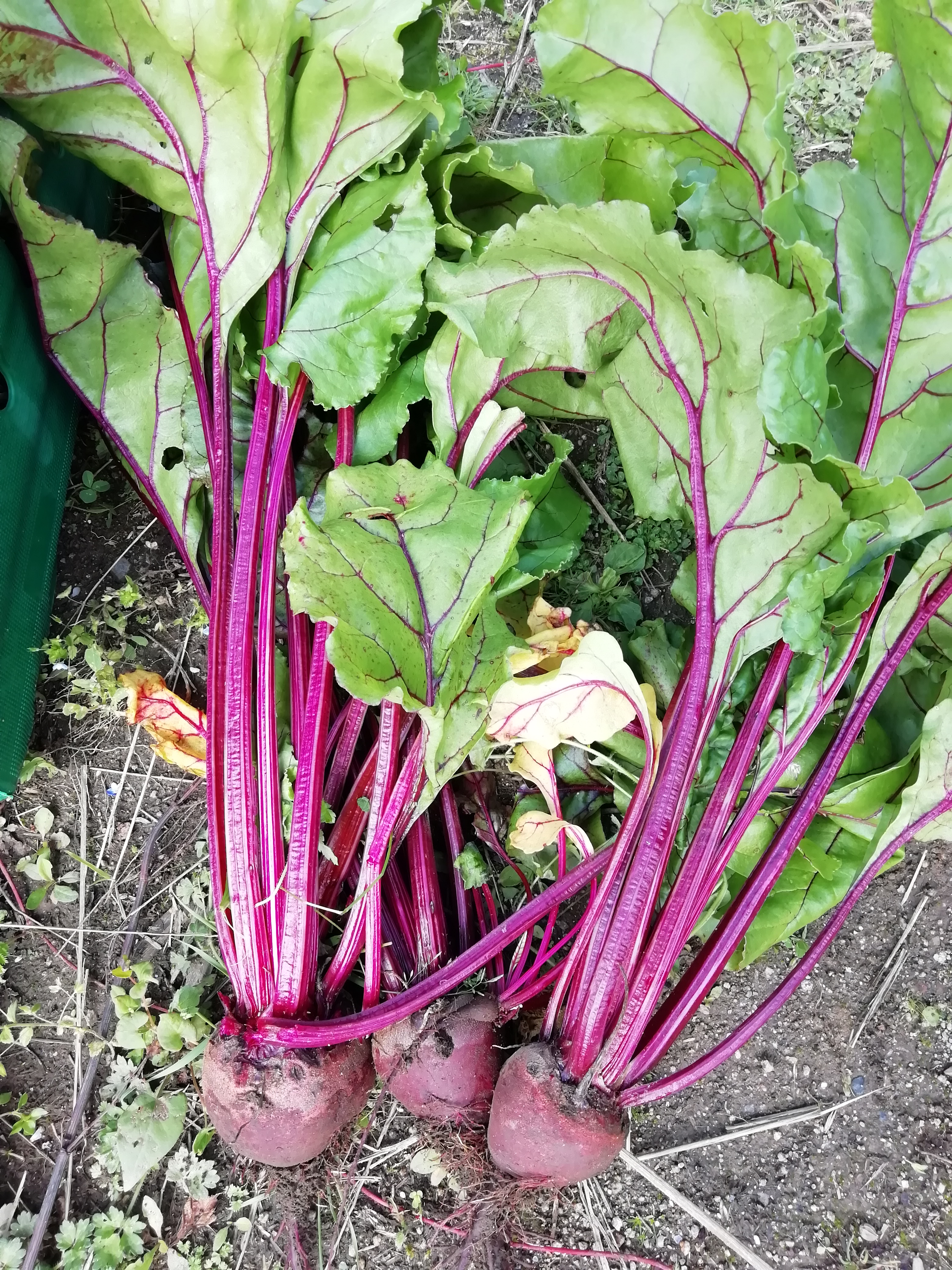 |
€ 3.00 /kg |
|
Courgette/Zucchini/Marrow Courgette is an excellent source of potassium, a heart friendly electrolyte and helps bring the reduction in blood pressure and heart rates by countering pressure effects of sodium. They are an excellent source of antioxidant vitamin-C, as well as offering vitamin-A, folates, B-complex vitamins like thiamin, pyridoxine, riboflavin and minerals like iron, manganese, phosphorus, and zinc. |
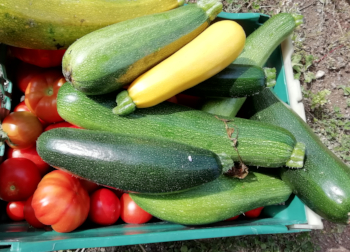 |
€ 3 /kg |
|
Lettuce Vitamins in lettuce are plentiful. Its fresh leaves are an excellent source of several Vitamin-A and β-carotenes. Just 100 g of fresh, raw-lettuce provides 247% daily values of vitamin-A, and 4,443 µg of β-carotene (Carotenes convert into vitamin-A in the body; 2 µg of carotene is considered equivalent to 1 IU of vitamin-A). These compounds have antioxidant properties. Vitamin A is required for maintaining healthy mucosa and skin and is also essential for vision. It is a rich source of vitamin-K which has a potential role in the bone metabolism where it thought to increase bone mass by promoting osteoblastic activity in the bone cells. It also has an established role in the Alzheimer's disease patients by limiting neuronal damage in the brain. Regular inclusion of lettuce in salads is known to prevent osteoporosis, iron-deficiency anemia, and believed to protect from cardiovascular diseases, ARMD, Alzheimer's disease and cancers. |
 |
€ 1 each |
|
Carrot The taste and goodness you used to get before the factory farm, and none of the sprays. YUM! CArrots are an exceptionally rich source of carotenes (ha ha) and vitamin-A. Studies have found that flavonoid compounds in carrots may offer to protect from skin, lung and oral cavity cancers. Carotenes convert into vitamin-A in the liver cells. Beta-carotene. Beta-carotene is one of the powerful natural antioxidants that protect the human body from harmful oxygen- derived free radicals. Also, it also carries out all the functions of vitamin-A such as maintaining good eye health, reproduction (sperm production), maintenance of epithelial integrity, growth and development. Carrots are rich in polyacetylene antioxidant, falcarinol. A research study conducted by scientists at the University of Newcastle on laboratory animals has found that falcarinol in carrots may help fight against cancers by destroying pre-cancerous cells in the tumors.
|
|
€ 3 /kg |
|
Tomatoes Well, these are just tasty, tasty, tasty. You can't get taste like that in the supermarket any more. Tomatoes contain very good levels of vitamin-A, and flavonoid antioxidants such as a and ß-carotenes, xanthins and lutein. Altogether, these pigment compounds are found to have antioxidant properties and take part in night-vision, maintenance of healthy mucosa and skin, and bones. Consumption of natural vegetables and fruits rich in flavonoids is known to help protect from lung and oral cavity cancers. They are also a good source of antioxidant vitamin-C which helps the body develop resistance against infectious agents and scavenge harmful free radicals. The antioxidants present in tomatoes are scientifically found to be protective against cancers, including colon, prostate, breast, endometrial, lung, and pancreatic tumors. Total -ORAC (Oxygen Radical Absorbance Capacity) in this vegetable is 367 µmol TE/100 g. Tomatoes offer lycopene, a flavonoid antioxidant,which together with carotenoids, may help protect cells and other structures from harmful oxygen-free radicals. Studies show that lycopene protects the skin from ultra-violet (UV) rays and thus offers some defense against skin cancer. Zea-xanthin also present abundantly in this vegetable helps protect eyes from "age-related macular related macular disease". Maybe that's why I can see better once teh tomato harvest has begun! |
|
€ 12 /kg |
|
Apples We have a range of apples from old and new trees. Sometimes we press them for juice at The Apple Farm (visit this fantastic family run place near Clonmel if you can). |
€ 2 /kg cooking € 4 /kg eating € 3 /75cl juice € 40 per box of 12 bottles of juice |
|
| Local Delivery | € 5 | |
| Also supplied to Ward's Greengrocer, Tullow, or collect from Ballin Temple. |
Our Approach
Our veg is "hand made". We aim to use natural methods and as little fossil fuel as possible. When we get it right the food is wholesome, healthy and uplifting.
As stewards of this small place on the planet, our responsibility is to nature and the plants and wildlife that lives here. There are few places left on the planet where humankind's big boots do not leave an imprint, so we wear flipflops often and try to walk gently on the land!
We have been prioritising sustainable methods since 1999. In 2001 we were certified "organic", but after 10 years we opted out of the certification process because it cost too much and we were invariably helping the inspector how to do their job! And does the government regulator know how many carrots must be sold to pay for their bureaucracy? This whiel they subsidise the industrialist spraying chemicals on your food....
Nevertheless, our methods remian organic, in some ways we are more rigorous than certification demands because we prefer to use low impact methods rather than have a manicured plot. So generally we
-
use organic seed
-
use homegrown compost or manure (never use inorganic compounds)
-
work the garden by hand, mechanical weeding only, don't use sprays
-
use compact tractors (2-wheel and regular) to minimise soil compaction
-
use gravity for irrigation if possible
-
care for livestock while allowing them as much liberty as possible
-
no killing
The results are clean, tasty vegetables, happy eggs from free birds (no cages - we have to look for the eggs) and delicious hay.
If you would like our vegetables or hay, please create an account (see module on right) to receive news about availability.
If you would like advice on growing, please contact Tom.

